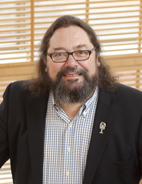- *This event has finished.
- Date: Monday, July 11, 2016, 7:00-8:30 pm
- Venue: Iwasaki Koyata Memorial Hall, International House of Japan
- Lecturer: Theodore C. Bestor (Professor of Social Anthropology and Director of the Reischauer Institute of Japanese Studies at Harvard University)
- Guest: Teshima Maiko (Producer of TSUKIJI WONDERLAND, Shochiku Co., Ltd.)
- Supported by Shochiku Co., Ltd.
- Language: English (without Japanese interpretation)
- Admission: 1,000 yen (Students and Non-Japanese: 500 yen, IHJ Members: Free) (reservations required, seating: 200)
On November 2, 2016, the last tuna, the last octopus, the last box of imported shrimp will be sold at the venerable Tsukiji wholesale market in central Tokyo. That day, the gates of the market will close, and on November 7, the market will reopen in its new location a couple of kilometers away in Toyosu. The Tsukiji marketplace has been in almost constant use since its opening in 1935, and for many market regulars and outside observers alike, the place is inseparable from the buying and selling of fish and from the images of what constitutes an ideal(ized) market. But the market has moved before (after the 1923 Great Kanto Earthquake), and many cherished institutions and traditions have developed or faded over the years. Based on his many years of research, Professor Bestor, author of Tsukiji: The Fish Market at the Center of the World (University of California Press, 2004; Kirakusha, 2007), will discuss the changing landscape of the market and the kinds of continuities that will survive the move. After his talk, the three-minute trailer of the documentary film TSUKIJI WONDERLAND which Professor Bestor was involved in as an advisor, will be shown and its producer Teshima Maiko will talk about behind-the-scenes stories.
Theodore C. Bestor
 Professor Bestor is a specialist on contemporary Japanese society and culture; much of his research focuses on Tokyo, and he has written widely on urban culture and history, local neighborhood society and identity, markets and economic organization, food culture, and popular culture as a defining aspect of urban Japanese life. Currently his research focuses on Japanese food culture and, in particular, on the globalization of Japanese cuisine and its intense popularity throughout the world, as well as on UNESCO’s recognition of Japan’s traditional cuisine (washoku) as an item of Global Intangible Cultural Heritage. He conducted research on this topic as the recipient of a Fulbright Senior Fellowship in Japan in the spring of 2015. His publications include Tsukiji: The Fish Market at the Center of the World (University of California Press, 2004). Prof. Bestor received his BA from Fairhaven College of Western Washington University and his MA and PhD from Stanford University. He began his professional career as Program Director for Japanese and Korean Studies at the Social Science Research Council. After teaching at Columbia and Cornell universities, he joined the Harvard faculty in 2001. He is past president of the Association for Asian Studies (2012-13), and the founding president of the Society for East Asian Anthropology. In June 2013 Prof. Bestor received the Commissioner’s Award for the Promotion of Japanese Culture from the Agency for Cultural Affairs of the Japanese government.
Professor Bestor is a specialist on contemporary Japanese society and culture; much of his research focuses on Tokyo, and he has written widely on urban culture and history, local neighborhood society and identity, markets and economic organization, food culture, and popular culture as a defining aspect of urban Japanese life. Currently his research focuses on Japanese food culture and, in particular, on the globalization of Japanese cuisine and its intense popularity throughout the world, as well as on UNESCO’s recognition of Japan’s traditional cuisine (washoku) as an item of Global Intangible Cultural Heritage. He conducted research on this topic as the recipient of a Fulbright Senior Fellowship in Japan in the spring of 2015. His publications include Tsukiji: The Fish Market at the Center of the World (University of California Press, 2004). Prof. Bestor received his BA from Fairhaven College of Western Washington University and his MA and PhD from Stanford University. He began his professional career as Program Director for Japanese and Korean Studies at the Social Science Research Council. After teaching at Columbia and Cornell universities, he joined the Harvard faculty in 2001. He is past president of the Association for Asian Studies (2012-13), and the founding president of the Society for East Asian Anthropology. In June 2013 Prof. Bestor received the Commissioner’s Award for the Promotion of Japanese Culture from the Agency for Cultural Affairs of the Japanese government.
What is TSUKIJI WONDERLAND?

Tsukiji―Best fish market in the world
Before its closing this coming November, the real scenes of Tsukiji Market will be unveiled by a fascinating documentary film TSUKIJI WONDERLAND. Tsukiji is well known as “the kitchen” (center) of Japanese food culture. TSUKIJI WONDERLAND filmed the daily lives of the professionals (middle traders) who live and work there throughout the year. It also captures beautiful seasonal scenary changes. Why are the leading chefs in Japan including Jiro from Jiro Dreams of Sushi attracted by Tsukiji?―This film steps into the backstage of Tsukiji where nobody has been able to film before. TSUKIJI WONDERLAND will be released on October 15, 2016.